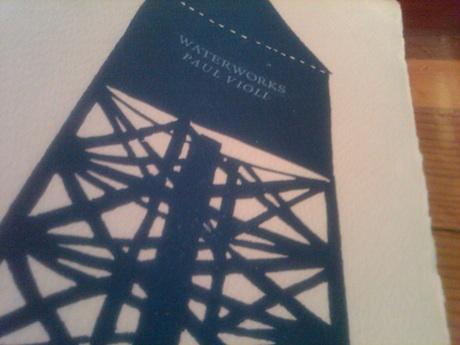It’s been a year of many deaths and maybe all years are but the poetry world seems bent by loss right now. Leslie Scalapino this time last year. Akilah Oliver died last month. This month Paul Violi. I want to chime in on the surprising (because Paul seemed the most present therefore the most local of men in his radiant charm) accolades from all corners who knew Paul, who loved his work, who thought they were his. And he theirs. Paul was my first real poetry teacher. From him I learned who was who (in the poetry world), what the map was of its ‘schools’, and which poems of mine were bad and good though he wouldn’t say why. One of the things I appreciated about his decisive vagueness is that he forced you to figure it out. I’m looking at his first book (Waterworks) which I owned years ago but somehow lost. It was handed to me the other night at a reading in Brooklyn by Nathaniel Otting, a poet who is part of the tribe of Violi fans. In Waterworks I read this:
FOR THE EARL OF SURREY
The golfer smiles in his polo shirt, the little
man has beaten the bully, the housewife is
using a new detergent and the Californian squints
behind his new sunglasses; the man in the diner likes
his new bow tie and so does the doctor who saved
the injured cheerleader; the detective uses hair
tonic, the stout nurse is immaculate, the waitress
wants to date the truck driver; the grocer slices
a pound of baloney, the reporter asks him how it
feels; the teacher wears a wild shirt, the coach
tells the youngster to shape up or ship out, the old
lady asks him the time, the woman in curlers orders
a hamburger and yet I want to jump for joy
Let’s see. I learned from this that a poem can end without period. And yet why? Well because now the poet will be always leaping into the air and by using this trick you will sustain surprise – in a tiny way for the rest of your reading/writing life. The innovation is slight – the poem doesn’t stop. So the poet and his joy are always a part of everything - that surprising shift from them to us, from the specific general to the general personal, the driver “I.” Also there’s a massive number of semicolons here. I find that interesting because it means that the surface of poetry can be prose. It’s a copy-edited poem. Its surface is continuous with the surface of journalism. And its subject? The crowd. We are jump cutting through the world; the rhythm is constant and building. I often think a poem like an orgasm is a counting thing. It’s not this many, but an enumerative act so that if you succumb to the poem as is your whole being is counting with it and its end will blow you apart as the poet was when the line curiously was thrust onto his being by the – would syllogism be correct? I think so, by the syllogism that is churning the very poem forward with each cartoon Hummel proposition, like the surging collage of the dancers on Laff-In, or the collage of a single panel cartoon in the Sunday papers – it’s a collective procedure, a surging crowd whose existence would seem to erase the note-taking poet who instead takes all of the collective’s energy on in earnest and like a unlikely criminal – which Violi was – to know him was to be complicit in his kind impishness both in life and work – he throws the car into reverse ejects himself out his seat by this action and leaves the poem by entering it at last. Bye Paul.
Eileen Myles was born in Cambridge, Massachusetts, and was educated at the University of Massachusetts...
Read Full Biography


